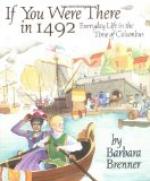Ferdinand and Isabella fell on their knees, giving thanks to God with many tears; and then the choristers of the royal chapel closed the grand ceremonial by singing the “Te Deum.” Afterwards men walked home grave and yet happy, having seen the symbol of a great work, something to be thought over for many a generation. Other marks of approbation for Columbus were not wanting. The agreement between him and the sovereigns was confirmed. An appropriate coat of arms, then a thing of much significance, was granted to him in augmentation of his own. In the shield are conspicuously emblazoned the Royal Arms of Castile and Leon. Nothing can better serve to show the immense favour which Columbus had obtained at court by his discovery than such a grant; and it is but a trifling addition to make, in recounting his now honours, that the title of Don was given to him and his descendants, and also to his brothers. He rode by the king’s side; was served at table as a grandee; “All hail!” was said to him on state occasions; and the men of his age, happy in that, had found out another great man to honour.
Grant by the pope.
The more prosaic part of the business had then to be attended to. The Sovereigns applied to the Pope Alexander the Sixth, to confer on the crowns of Castile and Leon the lands discovered and to be discovered in the Indies. To this application they soon received a favourable answer. The Pope granted to the Princes of Castile and Leon, and to their successors, the sovereign empire and principality of the Indies, and of the navigation there, with high and royal jurisdiction and imperial dignity and lordship over all that hemisphere. To preserve the peace between Spain and Portugal, the Pontiff divided the Spanish and Portuguese Indian sovereignties by an imaginary line drawn from pole to pole, one hundred leagues west of the Azores and the Cape de Verde Islands.
Second voyage planned.
Meanwhile the preparations were being made for a second voyage to be undertaken by the admiral. After the arrival of the apostolic bulls, and before the departure of Columbus from Barcelona, the nine Indians brought by him were baptized. Here, parenthetically, we may take note of something which, if the fact did correspond with what the Spaniards thought about it, would, indeed, be notable. One of the Indians, after being baptized, died, and was, we are told,[Herrera] the first of that nation, according to pious belief, who entered heaven.
We cannot help thinking of the hospitable and faithful Guacanagari, and imagining that, if his race had been like him, some one might already have reached the regions of the blessed. I do not, however, refer to this passage of Herrera for its boldness or its singularity, but because it brings before us again the profound import attached to baptism in those times, and may help to account for many seeming inconsistencies in the conduct of the Spaniards to the Indians.




